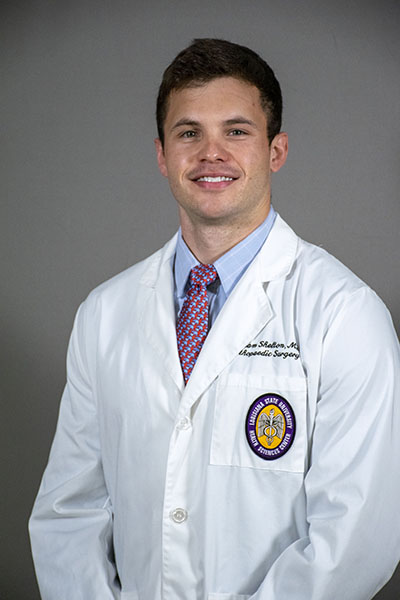William L. Shelton

Rothman Orthopaedic Institute Hand and Upper Extremity Surgery Fellowship
Class of 2020
Hometown
Dallas, Texas
What medical school did you attend?
UT Southwestern
What undergraduate school did you attend? What did you study?
Clemson University - Biological Sciences
What advice would you give to incoming residents?
Be available. Be on time. Listen. Read something.
What originally attracted you to the LSU SOM Ortho Residency program?
I was attracted to LSU Orthopaedic Residency because this program first, and foremost, trains excellent surgeons. While many programs will claim this, our unique and frequent one-on-one resident to faculty intraoperative interaction prepares us to tackle simple and difficult cases from day 1 of residency. Graduated autonomy ensures that 5th-year residents feel well prepared to handle both operative and non-operative management of patients at the time of graduation. We care for the largest number of underinsured patients in the state, we see patients at the largest private practice in the state, and we cover the biggest football teams in the state. We also have the added benefit of living in an incredible city.
What has been your favorite rotation so far and why?
My favorite rotation is Layfayette. It was the first time I began to synthesize orthopaedics. We run a general orthopaedic clinic for several months at a time, and we follow our own patients linearly. This experience forces you to take stock of your own technical skills and make difficult but rewarding decisions. We work with local sub-specialists, who offer tips and tricks for difficult cases.
What has proved the most challenging?
Layfayette is the most challenging. The clinic days are full, and surgery days require significant preparation. As residents, we indicate surgery, choose approaches, and pick implant companies. Managing your own clinics and operating rooms requires more active thought than other rotations, and work does not stop when you leave the hospital. This experience is rewarding because of the paradigm shift that takes place caring for “your own” patients.
Is there ONE (rotation, or teacher, or situation or something) that will benefit you or your career for the better that you can share?
The University Medical Center (UMC) trauma rotation provides critical clinical and surgical skills early and often. This rotation is the foundation of our program, and while challenging, teaches residents to make timely clinical decisions and deal with adversity.
